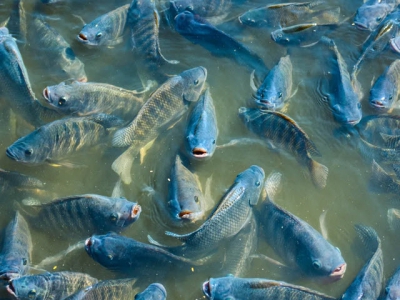Breeding tougher tilapia

A new genetic discovery could enable tilapia breeders to produce healthier and more resilient fish.
Nile tilapia are one of the most widely farmed fish species in the world
So claims a team of research scientists from Wageningen University, who have demonstrated that genes influence swimming fitness of tilapia. As there are indications that fitter fish are also healthier and more resilient, the researchers recommend including fitness in selective tilapia breeding programmes.
Nile tilapia are the most widely cultivated fish in the world, after the major carp species, and provide cheap protein and essential micronutrients - in particular to populations in Africa and Asia.
“In humans, cardiovascular fitness is typically measured through a cycling or treadmill test,” the programme leader Hans Komen said in a press release. “In farmed animals, this is rare. We have developed a methodology for fish. Our test shows for the first time that physical fitness, measured through this test, is largely inherited.”
In the study, which is now available to read in full in Scientific Reports, scientists made Nile tilapia swim against the flow in a carousel. By gradually increasing the flow, they were able to precisely measure when the fish reached their maximum swimming capacity. As in humans, their fitness depends on their ability to absorb oxygen and cardiovascular condition.
Fast swimming fish showed slower growth.
“We suspect this results from of an evolutionary principle,” says researcher Arjan Palstra. “To avoid predation, you can either swim faster to escape, or grow larger as a defence.”
There are also indications that fitter fish are healthier fish. The researchers therefore recommend that fish breeders include the swimming test in their selective breeding programmes. To date, the main focus for tilapia breeders has been increasing growth rate. In the past, fitness and resilience was not much of an issue, but with climate change accelerating, it is increasingly important to breed fish that can adapt to more stressful conditions.
Komen and his team intend to apply their results to other fish species, including trout, salmon and sea bream. As a result of climate change, the seawater temperature in Norway and the Mediterranean Sea is rising, affecting the physiology and fitness of fish cultivated in these regions.
The research project was funded by the Koepon Foundation and carried out in collaboration with WorldFish.
Related news
 Mekong Delta province encourages shrimp breeding in mangroves
Mekong Delta province encourages shrimp breeding in mangroves A new conservation project based in Trà Vinh, Vietnam is encouraging farmers to breed shrimp in mangrove habitats to protect the province’s forest cover
 Breeding breakthrough for tilapia in low oxygen systems
Breeding breakthrough for tilapia in low oxygen systems Tilapia breeders who aim to produce fish that cope well in aquaculture systems with low dissolved oxygen levels should consider a two-stage selection programme.
 Lessons from China - the future of IMTA
Lessons from China - the future of IMTA Integrated multi-trophic aquaculture (IMTA) is proving its worth in Sungo Bay in China, with numerous studies to support its environmental and economic benefits